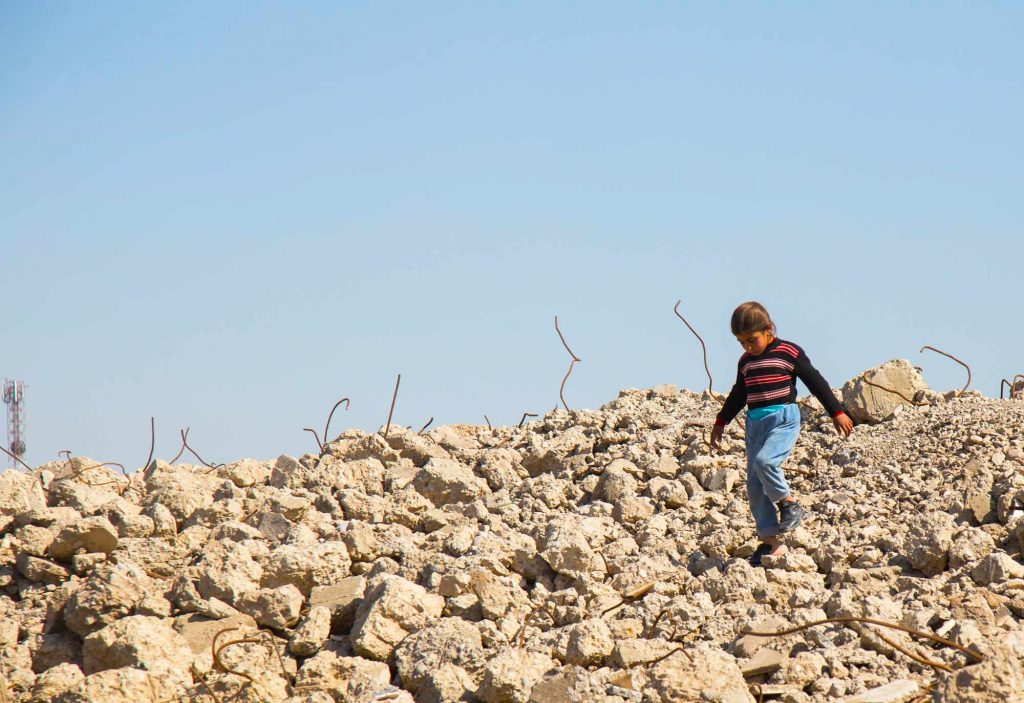
Crisis in Iraq
The Battle for Mosul
On July 9th, Iraq’s Prime Minister haider Al-Abadi declared the military offensive to retake Mosul from the Islamic State in Iraq and the Levant (ISIL) over. The nine-month-long battle uprooted nearly one million people from their homes and left much of Iraq’s second largest city in ruins. International Medical Corps is providing medical services, mental health and psychosocial care, supporting the survivors of GBV and providing other services that help protect the health and well-being of families in Mosul and displacement camps south and east of the city.

Displaced Persons
An estimated 825,000 people have been displaced since the start of the military operations in October 2016
Protection
Mosul's civilians have been exposed to extreme levels of violence, with thousands trapped in the city during intense clashes.
High Trauma Rates
Between October 2016 and May 2017, more than 12,700 people were transferred to hospitals for medical treatment.
Frequently Asked Questions
-
Why was there a battle for Mosul and who was involved?
Mosul had a population of about two million people when ISIL fighters captured the city in June 2014. About half a million residents fled rather than face being forced to live under the uncompromising brutality of ISIL rule. In October 2016, Iraqi Government and coalition forces launched an offensive to retake the city. The battle grinded on for nearly nine months and uprooted almost one million people from their homes. Iraq’s Prime Minister officially declared the offensive to retake Mosul over on July 9th. However, fighting has since been reported in pockets of the Old City and ISIL is still in control of other parts of Iraq.
-
Why is Mosul important?
For ISIL, the city served as an anchor in Iraq to balance the group’s Syrian stronghold of Raqqah, a major city about 50 miles south of the Turkish border. For the Government of Iraq, retaking Mosul means regaining control of its second-largest city, a hub of key industrial and trade significance.
-
What are some of the conditions civilians are facing?
While the fight for Mosul is officially over, enormous humanitarian needs remain. Huge swathes of the city are completely destroyed. Close to 10,000 sites and more than 100 kilometers of roads have been severely destroyed in Mosul, while food, water, electricity, and basic services are scarce at best across the city.
Security also remains a major challenge for in Mosul. Sporadic fighting continues in isolated areas and hundreds of people may still be trapped, while demining experts have estimated that it could take years and hundreds of millions of dollars to clear Mosul of explosives.
This makes it extremely difficult for the 682,000 Iraqis currently displaced from their homes to consider returning home. Many are living in overcrowded displacement camps outside of Mosul, where International Medical Corps is working to provide health care and other emergency services.
-
What specifically is International Medical Corps doing?
International Medical Corps is providing medical services, mental health and psychosocial care, supporting the survivors of gender-based violence and providing other services that help protect the health and well-being of families. This includes supporting eight primary health care clinics in eastern Mosul with medicines and supplies, building repairs and other assistance. To increase access to first aid inside Mosul, International Medical Corps also trained 120 volunteers in first aid from neighborhoods across eastern Mosul. In Jeda’a, Khazer, and Hammam al-Alil camps, which host thousands of families displaced from Mosul, International Medical Corps runs primary health care facilities that provide medical services and mental health and psychosocial support. Community health workers are also visiting families and organizing events in eastern Mosul as well as displacement camps to educate families on common illnesses and ways to stay healthy.
The Challenges
Our Response

Emergency Health Services
International Medical Corps worked with eight clinics in eastern Mosul to get them ready to once again care for patients. This includes restocking medicines, supplying generator fuel, and repairing the buildings themselves, including fixing damage came from being hit in the crossfire. Under ISIL, many clinics were forced to closed or operate with very limited capacity. This means that many people have gone without care for years, including those with chronic medical conditions like diabetes. International Medical Corps also has primary health facilities in Khazer, Jeda’a, and Hammam al-Alil displacement camps south and east of Mosul that provide much-needed medical services to those families who were forced to flee their homes because of the conflict. To build capacity within Mosul to care for trauma injuries, International Medical Corps also trained 120 residents from across Mosul in first aid and response.

Mental Health and Psychosocial Support
International Medical Corps integrated mental health care into all of its primary health care clinics so that patients have access to counseling and support services. Doctors and nurses in International Medical Corps clinics—as well as those supported in eastern Mosul—are also trained in mental health care and psychosocial support so that basic emotional and psychological needs can be addressed and referrals for higher-level care can be made as needed.

Gender-based Violence
International Medical Corps has established safe spaces for women and girls in Jeda’a and Hammam al-Alil displacement sites. These spaces allow for psychosocial activities as well as gender-based violence (GBV) case management support. These are activities are connected to our primary health care network so that medical care, mental health and psychosocial support, and other services can be provided as needed. At the same time, GBV outreach workers run community-based prevention and response campaigns, identify vulnerable women and girls, inform them of available services, and make referrals if needed.

Community Health Care Workers
We are also training local people to become community health workers, who then help their peers stay healthy through education and connecting them to our medical facilities. We have community health workers meeting with families and organizing educational events in eastern Mosul as well as Jeda’a and Khazer displacement camps.


